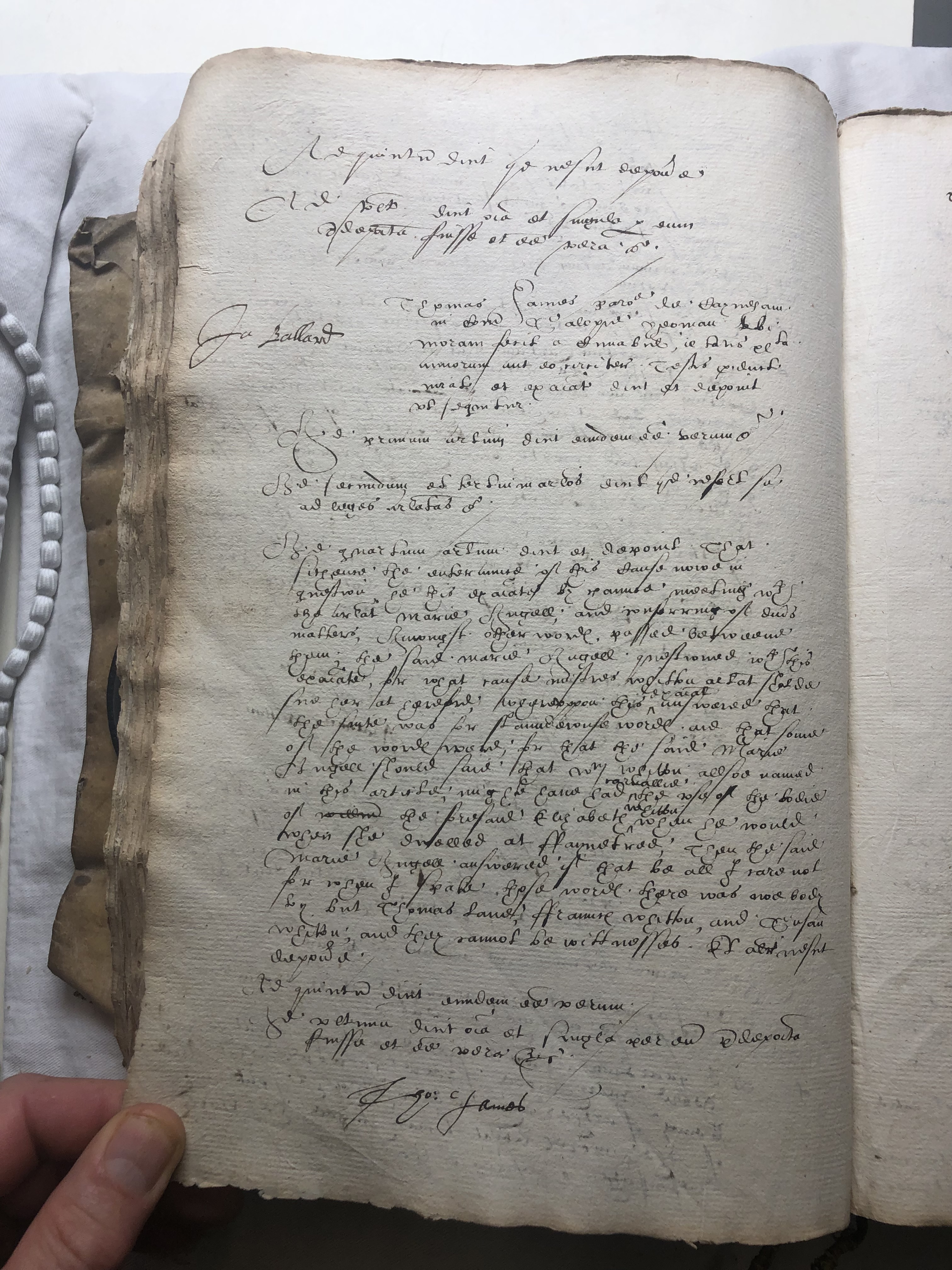f. 124v

Ad quintum dicit quod nescit deponere
Ad vltimum dicit omnia et singula per eum
predeposita fuisse et esse vera etc.
Iacobus Ballard
Thomas Iames parochie de Cayneham
in comitatu Salopie yeoman vbi
moram fecit a cunabulis, ætatis xlta
annorum aut eo circiter. Testis productus
iuratus et examinatus dicit et deponit
vt sequitur
Ad primum articulum dicit eundem esse verum etc.
Ad secundum et tertium articulos dicit quod refert se
ad leges articulatas etc.
Ad quartum articulum dicit et deponit That
sithence the enteraunce of this Cause now in
question, he this examinate by chaunce meeting with
the articulate Marie Angell, and conferring of diuers
matters, Amongst other wordes passed betweene
them, the said Marie Angell questioned with this
examinate, for what cause mistres whitton articulate sholde
sue her at hereford, wherevppon this \examinate/ answered that
the suite was for slaunderouse wordes. and that some
of the wordes were, for that the said Marie
Angell should saie that william whitton allsoe named
in this article, mighte haue had \carnallie/ the vse of the bodie
of william the foresaid Elizabeth \whitton/ when he would
when she dwelled at ffaynetree, Then the said
Marie Angell answered if that be all I care not
for when I spake those wordes there was noebody
by but Thomas Lane, ffraunces whitton, and Susan
whitton, and they cannot be wittnesses. Et aliter nescit
deponere.
Ad quintum dicit eundem esse verum.
Ad vltimum dicit omnia et singula per eum predeposita
fuisse et esse vera etc.
Thomas Iames
To the fifth he says that he knows nothing to depose.
To the last he says that all and singular deposed above by him were and are true etc.
Jacob Ballard
Thomas James, yeoman, of the parish of Caynham in the county of Shropshire where he has lived from the cradle aged forty years or thereabouts. The witness, produced, sworn, and examined, says and deposes as follows.
To the first article he says the same is true.
To the second and third articles he says that he refers to the articulate laws etc.
To the fourth articles he says and deposes that since the entrance of this cause now in question, he, this examinate, by chance meeting with the articulate Mary Angel and conferring of diverse matters, amongst other words passed between them, the said Mary Angel questioned with this examinate for what cause Mistress Whitton articulate should sue her at Hereford. Whereupon this examinate answered that the suit was for slanderous words and that some of the words were [slanderous], for that the said Mary Angel should say that William Whitton, also named in this article, might have had carnally the use of the body of the aforesaid Elizabeth Whitton when he would [i.e., whenever he wanted] when she dwelled at Faintree. Then the said Mary Angel answered, “If that be all I care not, for when I spoke these words there was nobody by but Thomas Lane, Francis Whitton, and Susan Whitton, and they cannot be witnesses.” And otherwise he knows nothing depose.
To the fifth he says it is true.
To the last he says that all and singular deposed above by him were and are true etc.
Thomas James